childminders providing funded early education places. Leah Findlay and
Peter Findlay explain the thinking behind the unusual set-up.

In August 2013, we took a grassy patch of land near our house, Woodland View, and with help from our community and parents attending our provision, transformed it into what we hope will be a living legacy, an example of innovative childcare and early education and a cherished memory that will live in the hearts and minds of our young charges for years.
As trained Steiner Waldorf teachers, we were looking to create an environment founded on Steiner's principles. As Steiner wrote: 'To truly know the world, look deeply within your own being; to truly know yourself, take real interest in the world.'
We were also inspired by Helle Heckmann, an inspirational Danish kindergarten teacher, who runs an outdoor provision that allows children 'the necessary peace it takes for a child to grow'. And so the result is our Mongolian-style yurt, with a wooden door and chimney and surrounded by a protective willow fence.
Creating and sustaining this kind of provision has been a steep learning curve for us, with much more to learn, as we live so closely off and on the land. However, in the 18 months since we started, we have noticed the profound effect that this provision has on the children. It also presents opportunities for learning about the wider world, and for personal growth.
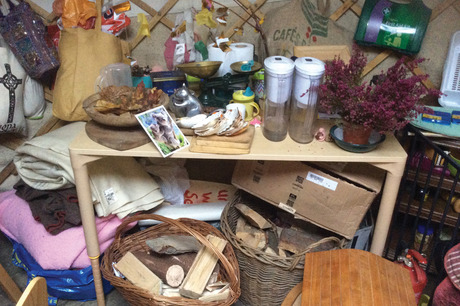
REAL WORK
In line with the Steiner Waldorf curriculum, we have always strived to empower children by participating in real work and to see how even the smallest of contributions, such as chopping fruit, have a real effect on the lives of everyone around us.
In terms of real work, there is plenty to do in the yurt, where the only heat source is a wood/coal burning stove, where the only lights are either solar-powered or need to be charged back at our house and where we can store only 40 litres of water at a time in our highly ergonomic water-roll.
Our two-year-olds will see the older children leaving with the water-roll and returning with water to wash hands and boil kettles for food preparation and washing-up. In Steiner education, 'imitation' is a guiding principle, but as great as it is for children to see adults working, the impact of seeing older children helping to chop wood and light the fire is tenfold.
As the children grow, we ask more of them, starting at age two with simple tasks such as doing the washing-up, and so a slow-burning experience of empowerment and confidence-building begins. We encourage independence not as a philosophical concept but as a real part of each day and often the two-year-olds will line up in front of the water-roll to have their hands washed by four-year-olds.
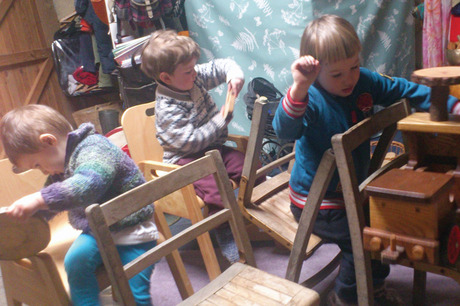
SUSTAINABILITY
The yurt, with its lack of running water and electricity, also provides plenty of opportunities to explore the idea of sustainability. We don't play at The Good Life; we live it. Thus, the children in our care are possessed with an understanding of the world and our place in it as we plant vegetables and herbs, compost our food waste and thank the sun for energising our solar-panelled lights.
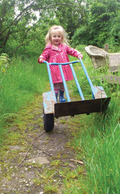 This autumn we went in the orchard and snuffled among the thick blanket of autumnal leaves to find a wealth of hazelnuts, shaking them carefully to see if we could hear the promise of a juicy nut rattling around inside the shell.
This autumn we went in the orchard and snuffled among the thick blanket of autumnal leaves to find a wealth of hazelnuts, shaking them carefully to see if we could hear the promise of a juicy nut rattling around inside the shell.
Back in the yurt, the children were soon helping to crack the shells - hard work for our two-year-olds. However, they were determined to see what was inside and were fascinated to find a juicy nut, a dried husk or, on some occasions, that our friend Squirrel Nutkin had got there first. We ate the nuts for our snack - a perfect little example of sustainability and how we can fill our bellies by observing the natural world and being part of it.
Such an approach fits with Heckmann's thinking. She notes, 'Childhood is a question of time, a lot of time. It takes a long time to become a human being, and time is what children need today, maybe more than ever. It is very difficult today to get the necessary peace it takes for a child to grow. Childhood is a unique time and the foundation for the rest of life. Early childhood is where the seed to everything precious is planted. This time never comes back, and mistakes made in childhood take a lifetime to repair.'
We also aid the children's physical development by providing recycled car tyres filled with fresh earth for digging and pallets and planks that can be used for den-building and balancing/climbing games. All the equipment is open-ended, inspiring play that strengthens and builds the child's imagination.
All the technology we use is in line with Early Years Foundation Stage exemptions granted to Steiner Waldorf early years settings by the Department for Education, enabling us to offer first-hand experiences of understanding the world rather than second-hand experiences of observing the world through screen time.
The technology we use is the best of ergonomic design and of vital importance to our day-to-day lives: our water-roll contains 40 litres of water, our lights use rechargeable batteries or solar panels and all our food and hot water is cooked and heated by real fires either in our outdoor fire pit or inside the yurt on a wood-burning stove.
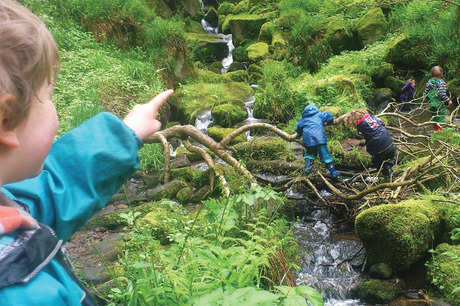
WITH THE SEASONS
The therapeutic aspect of nature seeps into our day-to-day experience at Woodland View. In spring and summer, we watch our willow fence and runner beans reaching higher into the sky with each passing day, and the grass grows fresh around the stepping stones and between the gaps in our wooden decking.
In the autumn, we have the perfect platform from which to watch the pageant of colours as the leaves change on the trees and the days begin to shorten. And, in the winter, we sit by the wood-burning stove and listen to the sound of the rain against the canvas of what the children often refer to as 'the tent'.
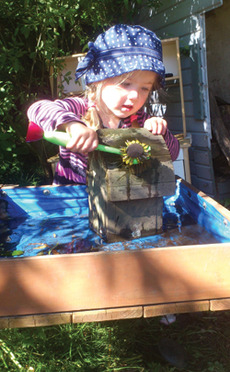 On winter mornings, we carry logs that have been sawn and cut by the children from the wood store, through the frost-bitten grass and into the yurt to place on the fire and bring all-important light and warmth into our lives. And then, in the spring, we are there to see the cycle begin again.
On winter mornings, we carry logs that have been sawn and cut by the children from the wood store, through the frost-bitten grass and into the yurt to place on the fire and bring all-important light and warmth into our lives. And then, in the spring, we are there to see the cycle begin again.
The nature of our provision changes with the seasons, so the summer is spent mostly in the garden, with us eating all our meals outside beneath a tarpaulin that affords respite from the sun, while in the winter we come inside more.
It is noticeable that if we need to be at the house for a few days, the children's behaviour becomes wilder and harder to manage than when we are based at the yurt or outside.
We hard-wire the children's experience of nature with seasonal finger rhymes, songs, circle times and stories, beginning with Lady Spring and a bear who is ready to come out of hibernation. We welcome the snowdrops and the promise of new life that they herald and look for tadpoles in the ponds of nearby gardens.
In winter, the children dress in jumpers, scarves, mittens and full waterproof suits that allow them to get as much vitamin D out of the day as possible, while in summer they wear sun hats and lotion when the sun is at her fiercest. And so our wards experience the elements first hand and learn about their gifts and their challenges.
As the days draw in our friend the robin comes to visit, perching on a house made out of wooden pallets and the children stop what they are doing to watch him. For our children these are not anecdotes or stories, but the building blocks of their lives. It is through such moments that they will become the adults that they need to be to make their way in an uncertain but beautiful world. And hopefully, like our friend the robin, they will come back from time to time to visit us and tell of their great adventures out there in the world.
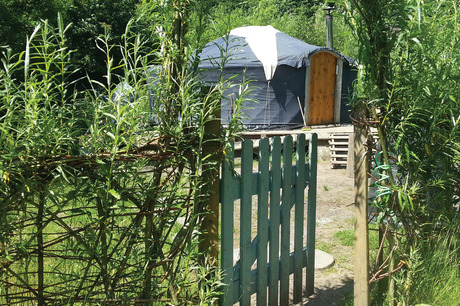
MORE INFORMATION
- Leah and Peter Findlay are on 01422 647102. Calderdale Council's senior early years and childcare sufficiency officer Nikki Wood is available on 01422 392694 and senior quality improvement support officer Gill Holden is on 01422 394193.
- Helle Heckmann, www.waldorftoday.com/2011/11/the-little-ones-by-helle-heckmann.









